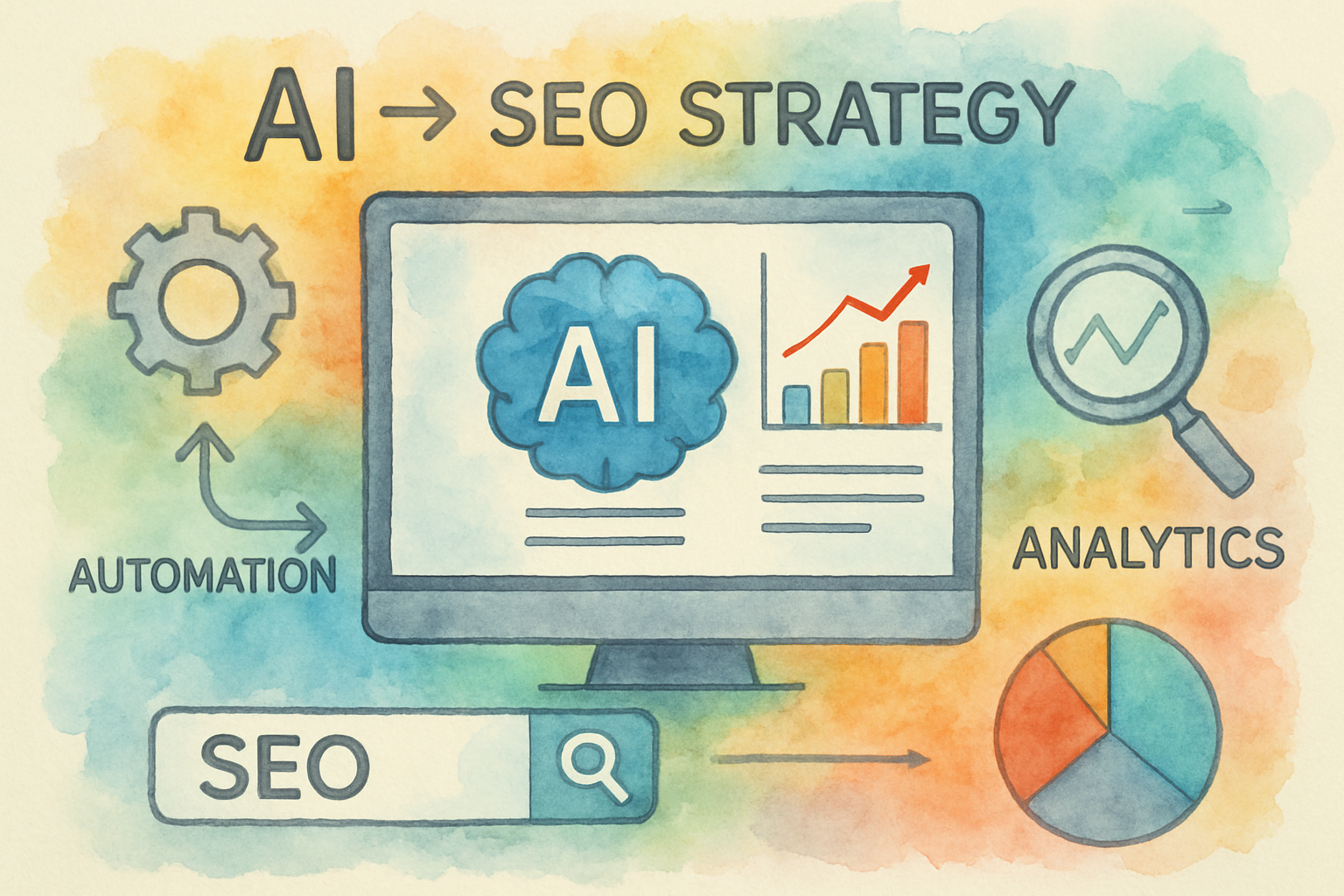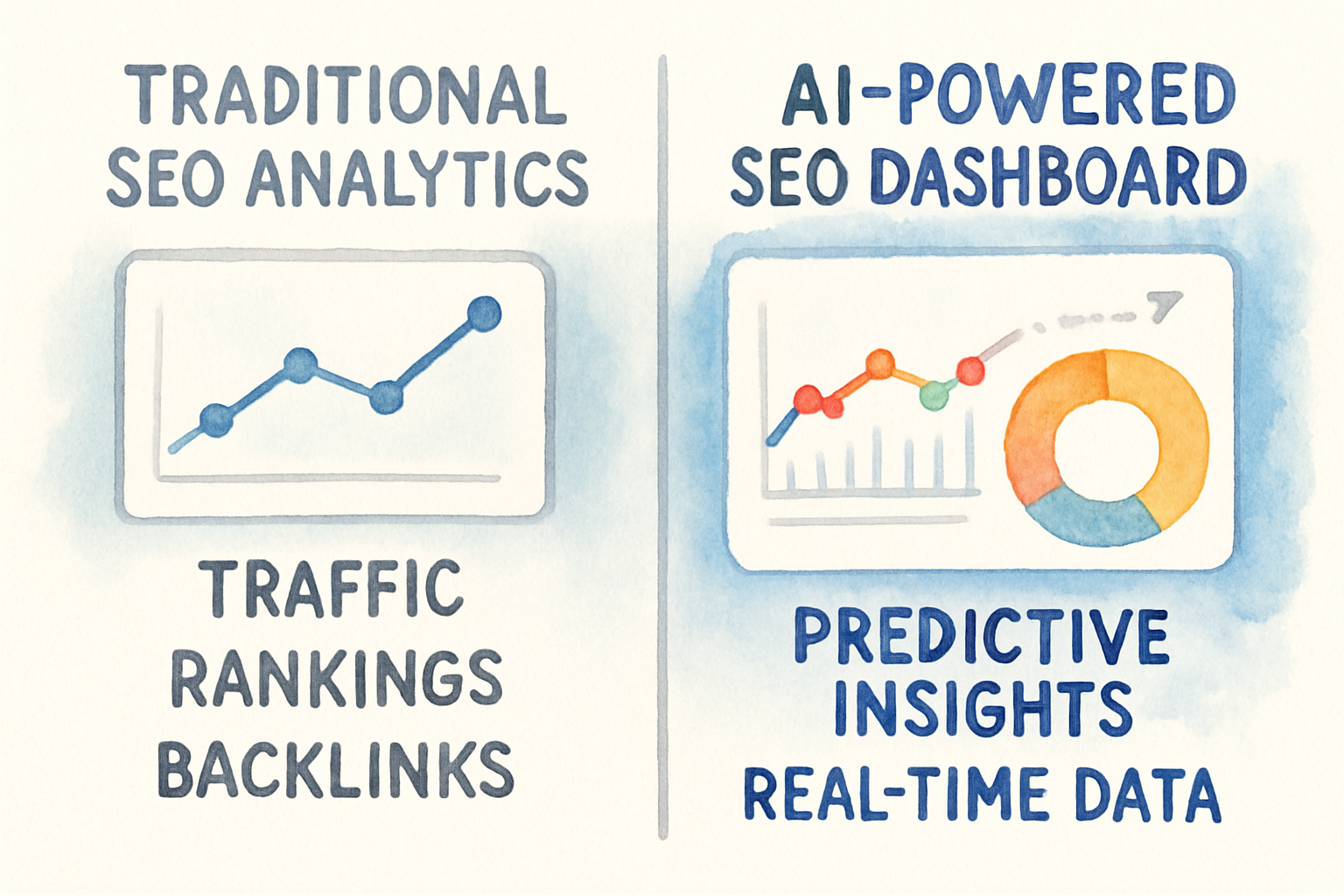It’s no secret that SEO analytics have evolved dramatically in recent years.
But what exactly is an AI dashboard for SEO, and why is it becoming indispensable?
This guide will walk you through everything you need to know about AI dashboards for SEO, including key features, benefits, and how to integrate them effectively.
Some are powered by sophisticated machine learning to forecast keyword trends.
Some are designed to unify marketing data across multiple channels for a holistic view.
Some provide real-time alerts that let you react instantly to traffic changes.
Some radically reduce the manual hours needed for SEO audits and optimizations.
Some integrate seamlessly with popular tools like Google Analytics and Search Console.
Let's dive right in.
What Is an AI Dashboard for SEO?
An AI dashboard for SEO is a software platform that leverages artificial intelligence to monitor, analyze, and optimize your website’s search engine performance in real-time.
Unlike traditional SEO tools that mostly report past performance, AI dashboards predict future trends and recommend proactive strategies, enabling marketers to act before problems arise.
For instance, while conventional tools might show how keywords performed last month, AI systems will forecast which keywords will drive valuable traffic next month, letting you reallocate your resources effectively.
These platforms typically integrate data from Google Analytics, Search Console, social media, PPC campaigns, and more, providing one comprehensive view that highlights actionable insights.
This approach aligns marketing analytics tightly with business goals, allowing teams to prioritize efforts based on ROI potential rather than raw data volume.
Overall, AI dashboards are transforming SEO from a reactive process into a dynamic strategic advantage for businesses (Source).
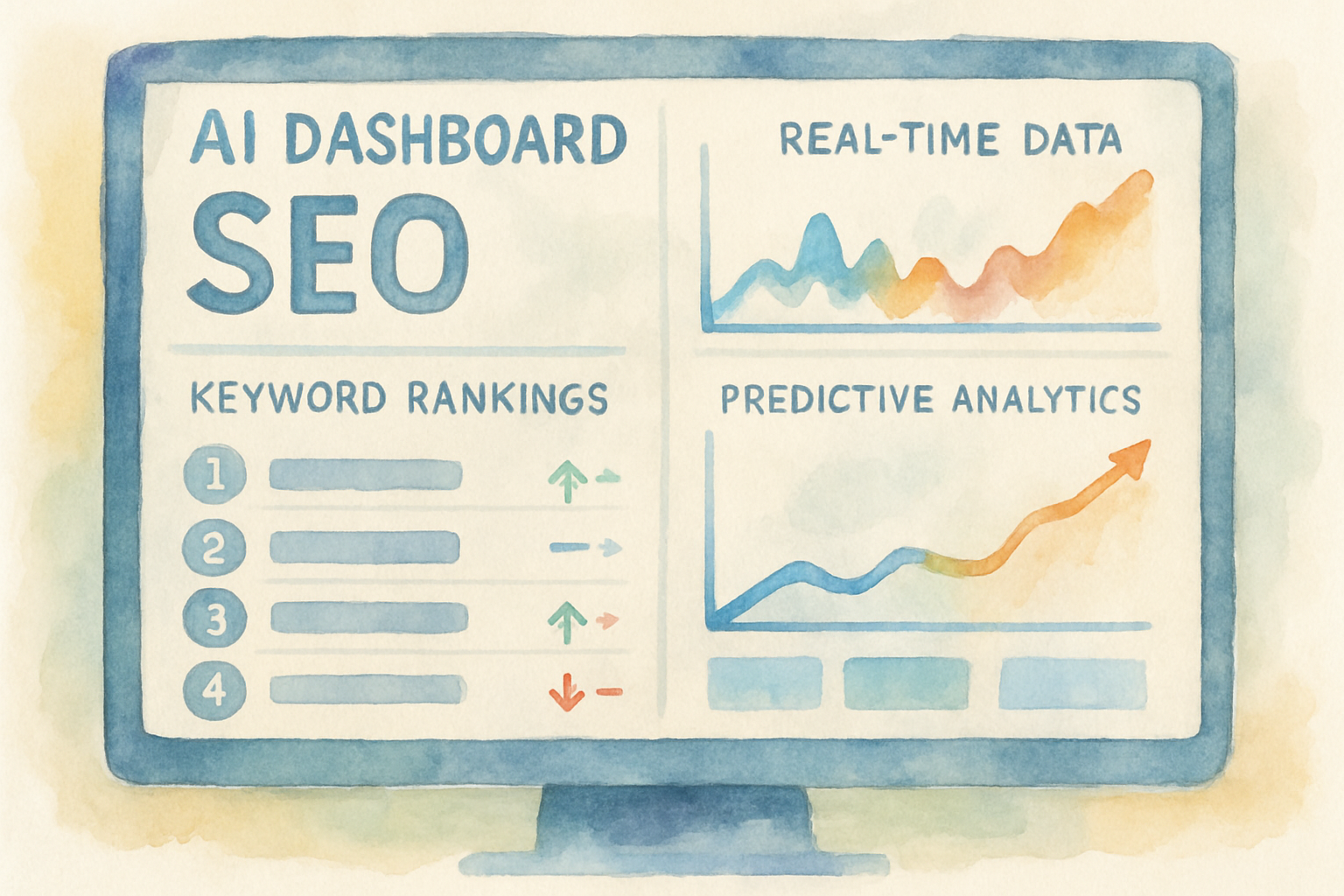
Why Do Marketers Need AI SEO Dashboards?
Modern SEO demands agility. Search algorithms and user behaviors change quickly.
Relying on data that's days or even weeks old can cause missed opportunities and costly mistakes.
AI SEO dashboards eliminate this lag by providing real-time monitoring and automated alerts that flag significant changes as they happen.
Imagine knowing instantly when a high-value page loses rankings or when a traffic spike occurs due to viral content.
This immediacy enables swift corrective actions or campaign boosts to capitalize on momentum.
Moreover, AI-powered predictive analytics offer powerful foresight, predicting keyword trends, seasonal traffic shifts, and competitive impacts to help you stay ahead.
Another key advantage is cross-channel attribution. AI dashboards can tie organic SEO efforts to paid campaigns, social media performance, and email marketing, showing how they collectively drive conversions.
Such integrated analysis is impossible in siloed reporting systems, providing marketers with a complete picture to optimize budgets and messaging.
Because AI dashboards automate labor-intensive tasks—like identifying technical SEO issues, suggesting content updates, and analyzing backlinks—they free up marketers to focus on creativity and strategy.
For example, SEO agencies report completing nearly a year's worth of SEO work in just 30 minutes leveraging AI tools, drastically boosting productivity and results (Source).
How Do AI SEO Dashboards Work?
AI SEO dashboards combine multiple data sources and apply machine learning algorithms to analyze patterns and predict outcomes.
Here's how a typical workflow functions:
- Data Integration: Connect your marketing channels, including Google Analytics, Search Console, advertising platforms, social media, CRM, and e-commerce.
- Real-Time Data Collection: The dashboard continuously ingests fresh data to maintain up-to-the-minute reports.
- Pattern Recognition: AI scans for anomalies like sudden drops in rankings, unexpected traffic spikes, or emerging keyword opportunities.
- Predictive Analytics: Using historical data and trend analysis, the system forecasts future traffic, keyword performance, and competitor moves.
- Automated Recommendations: It suggests specific actions such as content refreshes, technical fixes, or link building to remedy issues or leverage opportunities.
- Alerts & Reporting: Customizable alerts notify teams of urgent matters. Detailed reports can be generated for stakeholders, highlighting KPIs by department or role.
Some advanced AI dashboards even incorporate offline customer data like in-store visits and phone calls, providing true end-to-end attribution for omnichannel businesses.
Over time, the AI model learns your unique business patterns for increasingly accurate predictions and tailored recommendations.
This combination of automation, insight, and ease-of-use makes AI dashboards a game-changer for performance marketing (Source).
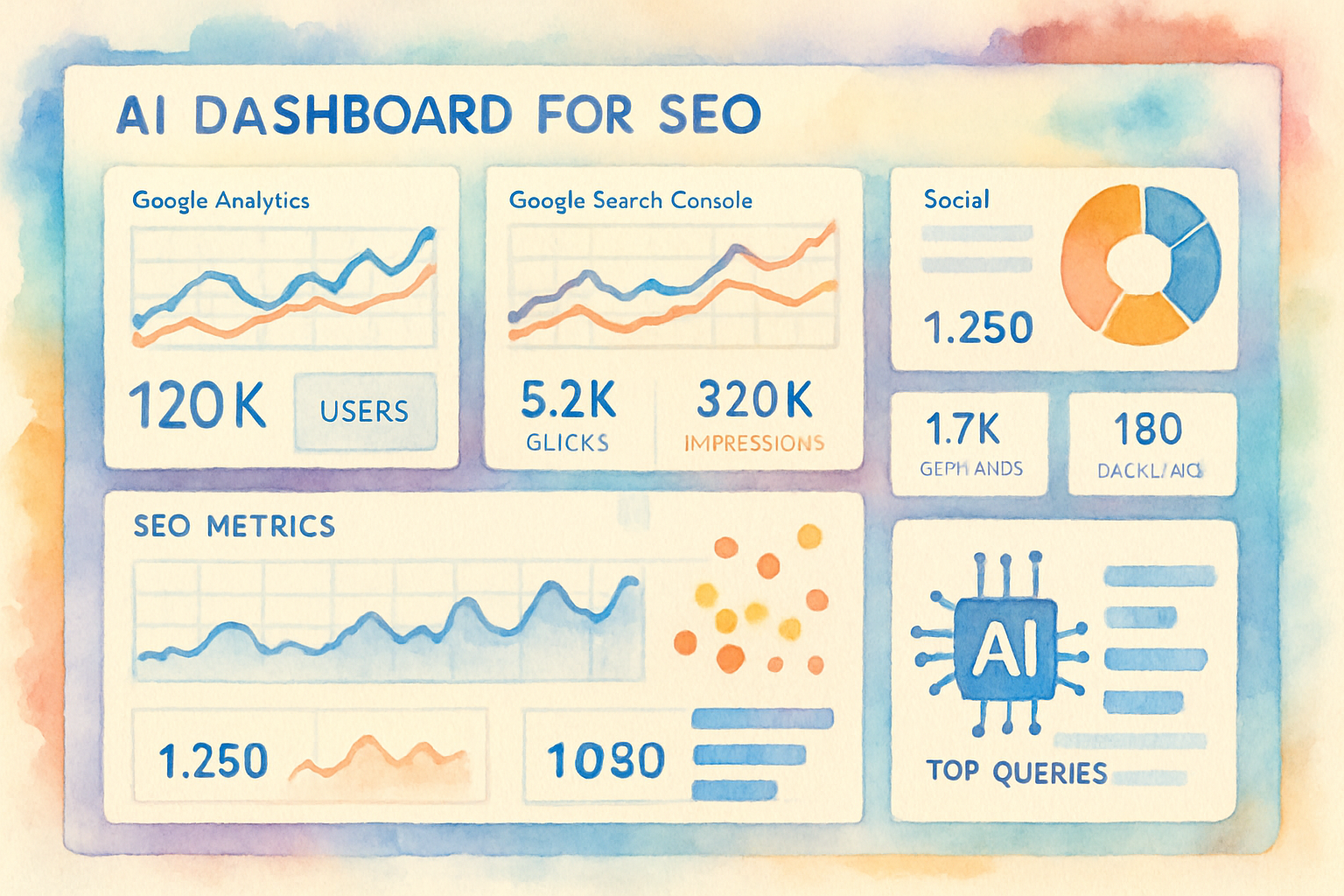
Which Metrics Should AI SEO Dashboards Track?
Effective AI SEO dashboards monitor a mix of conventional and AI-enhanced metrics to give a multi-dimensional view of SEO performance.
Key metrics include:
- Organic Traffic: Total visitors arriving via search engines.
- Keyword Rankings: Position changes for targeted keywords, including semantic and topical relevance scores.
- Click-Through Rate (CTR): How often users click your listing versus impressions received.
- Conversion Rates: Percentage of organic visitors completing desired actions like form submissions, calls, or purchases.
- Technical Health: Page speed, Core Web Vitals, mobile usability, crawl errors, and indexing status.
- Backlink Profile: Quantity, quality, and indexing of inbound links.
- Content Freshness & Topical Authority: How recently and comprehensively content has been updated relevant to target topics.
- Social & Paid Attribution: Impact of social shares and PPC campaigns on organic rankings and traffic.
- AI Visibility Metrics: Frequency and position of your content in AI search engine overviews such as ChatGPT or Google's AI summaries.
- Geo Analytics: Tracking brand mentions and search performance in specific locations and AI platforms.
Tracking these with AI enables predictive scoring, early warning signals, and prioritized action lists to boost SEO health proactively.
How to Choose the Right AI SEO Dashboard Platform?
Selecting the ideal AI dashboard is critical and depends on your business size, goals, and tech stack.
Consider these factors:
- Integration: Verify support for your existing SEO, analytics, advertising, CRM, and social tools to ensure seamless data flow.
- AI Capabilities: Look for predictive analytics, automated recommendations, anomaly detection, and customizable alert systems.
- Ease of Use: User-friendly interfaces let all team members—from executives to specialists—access relevant insights without a steep learning curve.
- Customization: Ability to tailor KPIs, dashboards, and reports to specific business goals and user roles ensures focus and clarity.
- Scalability: Platforms should accommodate growing data volumes and team needs.
- Privacy Compliance: Features that support evolving regulations around data tracking and user privacy.
- Support & Training: Adequate onboarding, documentation, and responsive support boost adoption and effectiveness.
Additionally, vendor reputation and community feedback can provide valuable insights. Many marketers find that platforms presenting complex data simply while offering deep drill-downs serve best.
Keep in mind: implementing AI dashboards is a process. Begin with foundational metrics and gradually layer in AI-driven features as your team becomes accustomed to the technology (Source).
Can AI SEO Dashboards Really Improve Performance? Evidence and Case Studies
The proof is in measurable results. Many businesses and agencies report dramatic performance improvements after adopting AI SEO dashboards.
For example, one SEO agency using Search Atlas with AI-powered automation increased clicks by 91% and impressions by 41% over just three months.
They nearly doubled their click-through rate and generated almost 1,000 additional leads, including 800 extra phone calls year-over-year in the same period.
What’s more impressive is their audit process improved exponentially. AI automation fixed over 5,000 backend technical SEO issues that would have otherwise taken 274 days manually, completing nearly a year’s work in less than 30 minutes (Source).
Tip: Always track ROI by measuring specific KPIs like lead volume, conversion rates, and revenue impact to justify your AI dashboard investment.
Another case involves a higher education institution leveraging AI dashboards to track branded impressions and AI referrals separately.
This nuanced insight helped link improved site engagement metrics directly to increases in student applications and enrollments, proving the real-world value of AI-enhanced SEO measurement (Source).
Step-by-Step: How to Implement an AI Dashboard for SEO
Implementing an AI dashboard might seem daunting, but breaking it down clears the path.
- Assess Current Analytics: Review what tools you use, what data is available, and any gaps or quality issues.
- Define Goals and KPIs: Work with your team to identify business goals and the metrics that directly impact them.
- Select the Platform: Evaluate AI dashboard platforms based on integrations, AI features, scalability, and budget.
- Integrate Data Sources: Connect Google Analytics, Search Console, PPC platforms, CRM, and others to centralize data.
- Configure Dashboards and Alerts: Customize views and notifications to align with team roles and priorities.
- Train Your Team: Provide comprehensive training on how to interpret data, take recommended actions, and report results.
- Monitor and Iterate: Regularly audit data quality, review AI insights effectiveness, and refine dashboard configurations.
This phased approach ensures quality data, smooth adoption, and maximizes the benefit from AI-powered insights and automation.
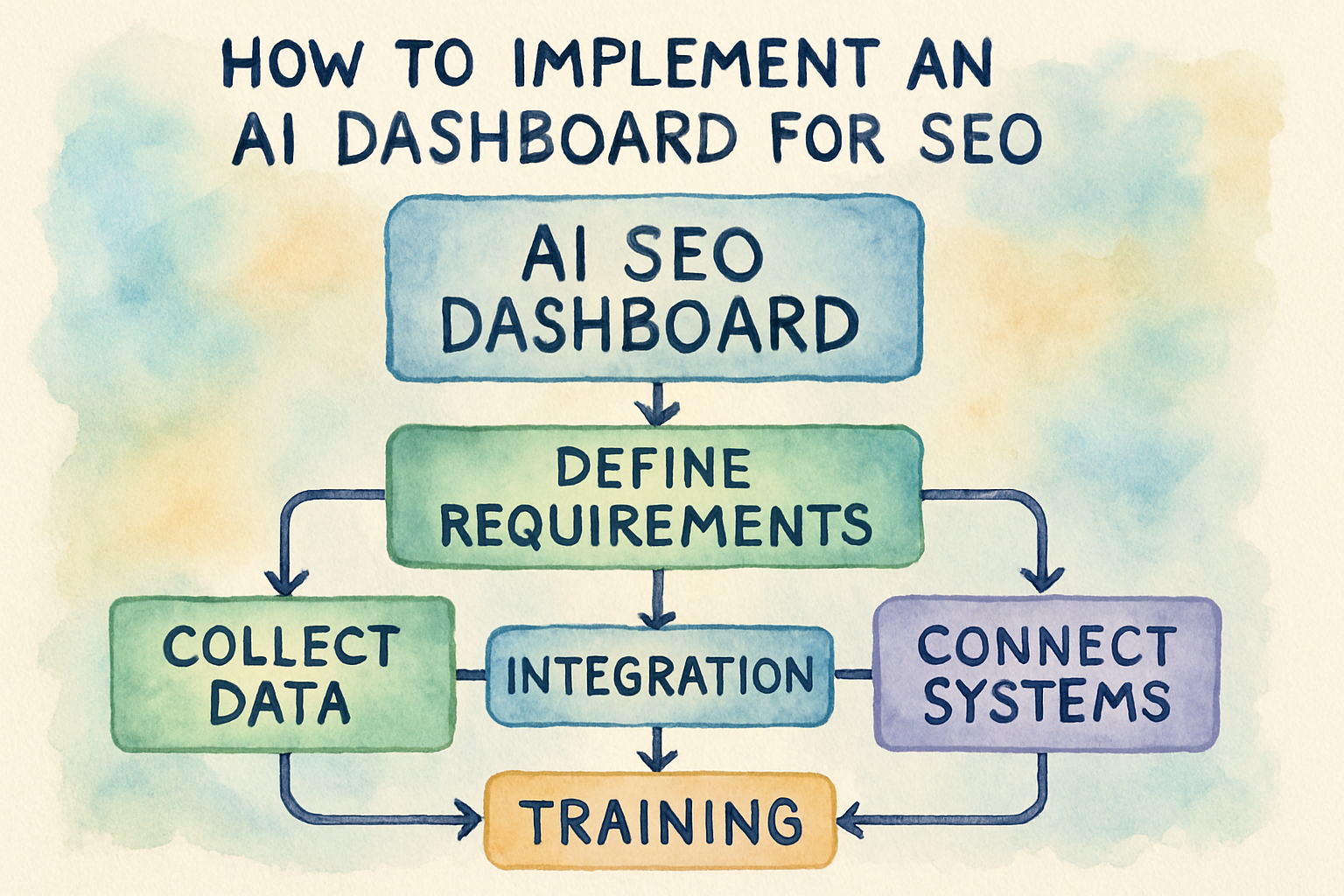
Common Challenges and How to Overcome Them with AI Dashboards
Marketers face several hurdles when shifting to AI-driven SEO analytics:
- Data Overload: Excess data can overwhelm teams, causing analysis paralysis without focus.
- Integration Issues: Disparate tools and inconsistent implementation create inaccurate or incomplete datasets.
- User Adoption: Resistance to change arises if dashboards are difficult or irrelevant to user roles.
- Privacy Compliance: Regulatory changes demand careful handling of customer data throughout analytics.
- Trust in AI Insights: Marketers may doubt automated recommendations without clear explanations.
Solutions include:
- Customize dashboards to focus on leading indicators and actionable metrics relevant to each audience.
- Perform regular data audits to maintain consistency and accuracy.
- Provide user-friendly interfaces and role-tailored access levels to improve adoption.
- Implement privacy-compliant tracking technology that balances regulation with insight quality.
- Supplement AI insights with human expertise and encourage iterative learning.
These approaches reduce friction and ensure your AI dashboard drives real-world SEO improvements sustainably (Source).
What Are the Future Trends for AI Dashboards in SEO?
The AI SEO landscape keeps evolving rapidly with exciting trends on the horizon:
- Generative Search Optimization: As AI search engines like ChatGPT and Perplexity gain traction, dashboards will provide visibility into your content's presence and citation in AI responses.
- Automated Response Systems: Dashboards will integrate with real-time systems to automatically adjust bids, update content, and fix technical issues driven by AI insights.
- Comprehensive Omnichannel Attribution: Offline and online customer journey data will merge to form true end-to-end marketing performance views.
- Greater Personalization: AI dashboards will tailor insights not only by role but also by individual workflow, boosting productivity.
- Privacy-First Analytics: Tools will honor evolving data regulations while maximizing first-party data advantage.
- Cross-Platform AI Visibility Tracking: Marketers will track brand presence across multiple AI search engines, mastering optimization for this expanding landscape.
Keeping abreast of these developments will ensure your SEO strategy remains cutting-edge and resilient in the AI era.
How Can I Start Using AI Dashboards for SEO Today?
Ready to transform your SEO with AI-powered dashboards? Here’s where to begin:
- Identify key SEO challenges like slow data turnaround, missed keyword opportunities, or incomplete cross-channel tracking.
- Research platforms with strong AI features and straightforward integrations relevant to your current setup.
- Take advantage of free trials (like the one mentioned in the Search Atlas demo) to explore features hands-on.
- Start small—integrate core data and focus on a handful of KPIs before scaling AI capabilities.
- Involve your team early, provide training, and establish regular review rhythms for insights and actions.
- Link AI dashboard insights to your broader marketing and business goals to demonstrate value.
Integrating these tools today sets the stage for smarter, faster SEO wins that will keep you ahead in competitive digital landscapes.
Wondering how to best structure your SEO efforts alongside an AI dashboard? Check out our detailed step-by-step guide to automating SEO content creation for a complementary strategy.
FAQ About AI Dashboard for SEO
- How does AI predictive analytics improve SEO strategy?
- AI predictive analytics use historical data and patterns to forecast future keyword opportunities and traffic trends. This lets you prioritize resources on high-impact areas before issues arise or opportunities are missed.
- Can AI dashboards replace human SEO expertise?
- Not entirely. AI dashboards automate data analysis and surface actionable insights, but experienced marketers are needed to interpret recommendations, create content, and craft overall strategy.
- What integrations are essential for an AI SEO dashboard?
- Key integrations include Google Analytics, Google Search Console, PPC platforms (Google Ads, Facebook Ads), social media analytics, CRM systems, and backlink monitoring tools for a comprehensive view.
- How quickly can businesses see ROI from AI SEO dashboards?
- Many report initial improvements in 30-60 days with full ROI typically realized within 6-12 months as teams adapt workflows and AI models learn business patterns.
- Are AI SEO dashboards suitable for small businesses?
- Yes, many solutions scale to different sizes and budgets. The key is starting with core features relevant to your needs and gradually adopting advanced AI capabilities.
- How do AI dashboards handle data privacy?
- Modern platforms comply with evolving regulations by supporting privacy-conscious tracking methods, anonymizing data, and emphasizing first-party data to protect user privacy.
What’s Your Next Step?
Tell us in the comments: How will you apply this to your SEO strategy? For personalized advice, explore our blog for the latest articles and insights!
